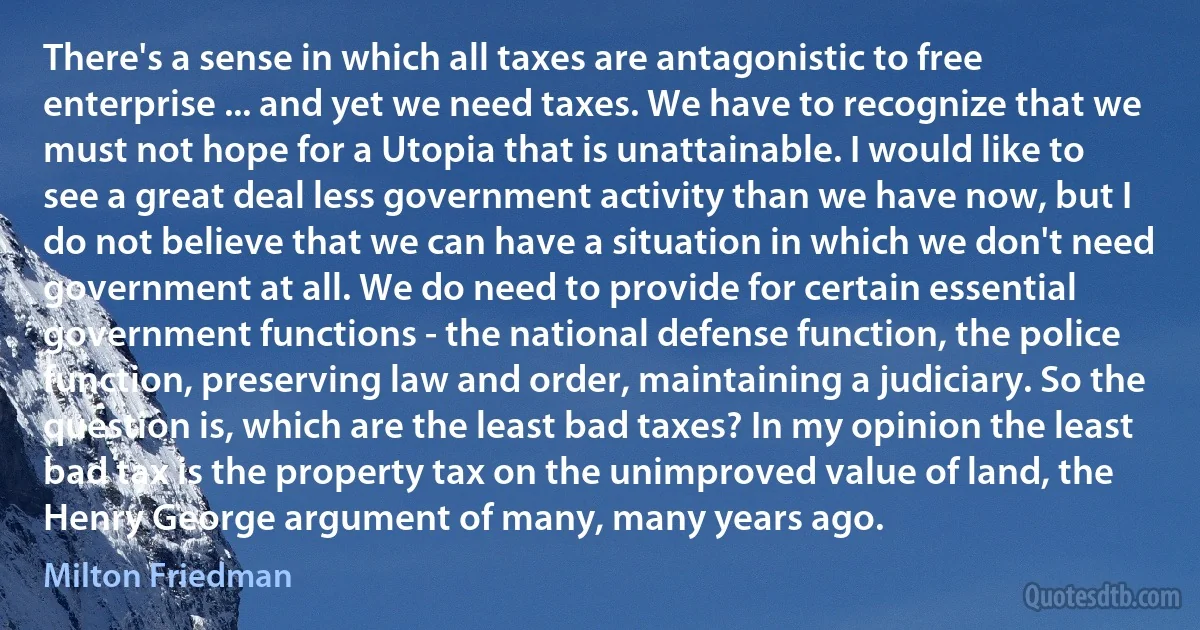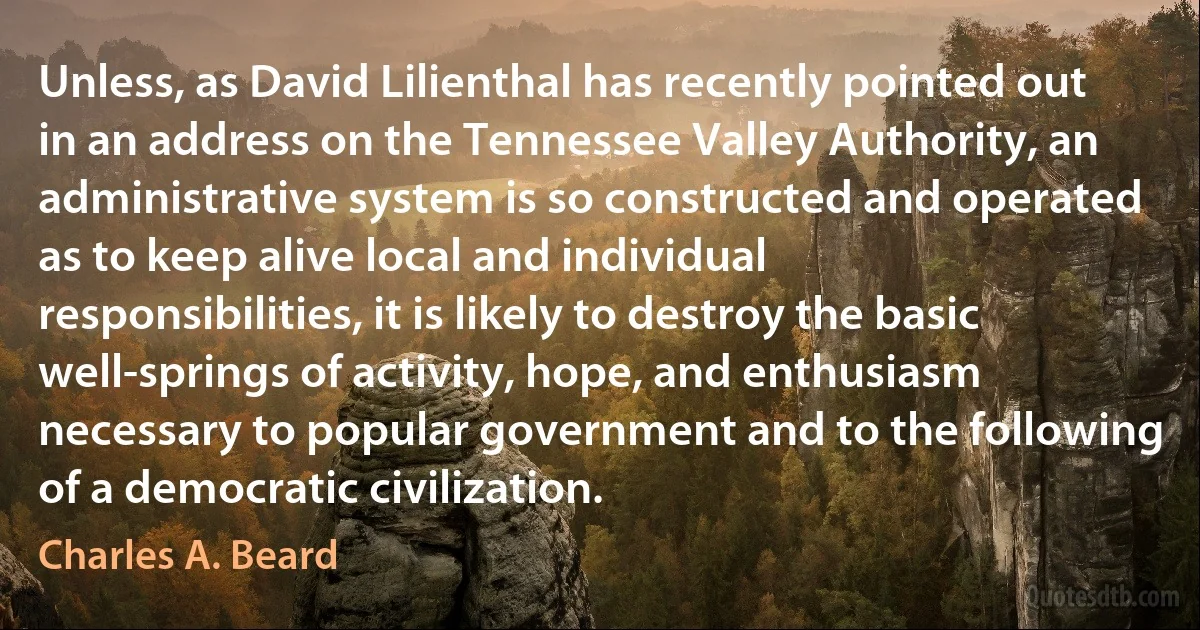Activity Quotes - page 55
The restoration of our world-view can come only as a result of inexorably truth-loving and recklessly courageous thought. Such thinking alone is mature enough to learn by experience how the rational, when it thinks itself out to a conclusion, passes necessarily over into the non-rational. World- and life-affirmation and ethics are non-rational. They are not justified by any corresponding knowledge of the nature of the world, but are the disposition in which, through the inner compulsion of our will-to-live, we determine our relation to the world.
What the activity of this disposition of ours means in the evolution of the world, we do not know. Nor can we regulate this activity from outside; we must leave entirely to each individual its shaping and its extension. From every point of view, then, world- and life-affirmation and ethics are non-rational, and we must have the courage to admit it.

Albert Schweitzer
There is particular danger at the moment that powerful political alignments in the United States are pushing strongly to exacerbate the developing crisis with Russia. The New York Times, which broke the story that the Kremlin had been paying the Afghan Taliban bounties to kill American soldiers, has been particularly assiduous in promoting the tale of perfidious Moscow. Initial Times coverage, which claimed that the activity had been confirmed by both intelligence sources and money tracking, was supplemented by delusional nonsense from former Obama National Security Advisor Susan Rice, who asks "Why does Trump put Russia first?” before calling for a "swift and significant U.S. response.” Rice, who is being mentioned as a possible Biden choice for Vice President, certainly knows about swift and significant as she was one of the architects of the destruction of Libya and the escalation of U.S. military and intelligence operations directed against a non-threatening Syria.

Susan Rice
Man's social practice is not confined to activity in production, but takes many other forms--class struggle, political life, scientific and artistic pursuits; in short, as a social being, man participates in all spheres of the practical life of society. Thus man, in varying degrees, comes to know the different relations between man and man, not only through his material life but also through his political and cultural life (both of which are intimately bound up with material life). Of these other types of social practice, class struggle in particular, in all its various forms, exerts a profound influence on the development of man's knowledge. In class society everyone lives as a member of a particular class, and every kind of thinking, without exception, is stamped with the brand of a class.

Mao Zedong
How both the objective world accommodates to presentations in us, and presentations in us to the objective world, is unintelligible unless between the two worlds, the ideal and the real, there exists a pre-determined harmony. But this latter is itself unthinkable unless the activity, whereby the objective world, is produced, is at bottom identical with that which expresses itself in volition, and vice versa.

Friedrich Schelling
What is the end of all the magnificent means provided by the productive activity of American society? Have not the means swallowed the ends, and does not the unrestricted production of means indicate the absence of ends? Even many born Americans are today inclined to answer the last question affirmatively. But there is more involved in the production of means. It is not the tools and gadgets that are the telos, the inner aim of production; it is the production itself. The means are more than means; they are felt as creations, as symbols of the infinite possibilities implied in man's productivity. Being-itself is essentially productive.

Paul Tillich
After many years of working with and listening to American adolescents, I don't believe they are ready for sex or its potential consequences – parenthood, abortion, sexually transmitted diseases – and I think we need to do everything in our power to discourage sexual activity and encourage abstinence.

Hillary Clinton
In seventeenth- and eighteenth-century France, race was already a weapon in the struggle between absolutism, aristocracy, and the middle class. The warfare spread to the arts and philosophy in the nineteenth century, by which time independent shoots in other cultures had also borne fruit, leaving the grand harvesting on a world-wide scale to our generation.
Viewed in the light of such facts, the race question appears a much bigger affair than a trumped-up excuse for local persecution. It becomes rather a mode of thought endemic in Western civilization. It defaces every type of mental activity - history, art, politics, science and social reform.

Jacques Barzun
The grand, leading principle, towards which every argument hitherto unfolded in these pages directly converges, is the absolute and essential importance of human development in its richest diversity; but national education, since at least it presupposes the selection and appointment of some one instructor, must always promote a definite form of development, however careful to avoid such an error. And hence it is attended with all those disadvantages which we before observed to flow from such a positive policy; and it only remains to be added, that every restriction becomes more directly fatal, when it operates on the moral part of our nature,-that if there is one thing more than another which absolutely requires free activity on the part of the individual, it is precisely education, whose object it is to develop the individual.

Wilhelm von Humboldt
Before the nineteenth century, writers on education portayed the "improvement of mind" as an activity mainly suited to gentlemen. ...both Thomas Jefferson and Benjamin Rush had venerated David Rittenhouse as an example of how arduous philosophical investigation might elevate the child of humble parents. But Jefferson and Rush tagged Rittenhouse as a genius, and hence untypical, and each employed Rittenhouse as ammunition in a debate among educated gentlemen. Jefferson invoked Rittenhouse in his Notes on the State of Virginia, a book he wrote to disabuse French philosophes of the notion that all specied degenerated in the New World; Rush used his eulogy of Rittenhouse before the select audience of the American Philosophical Society to ridicule colleges for requiring students to learn the ancient languages.

David Rittenhouse
He always left a strong and distinctive trace. His personality exerted a great influence on people, on their knowledge, worldview, approach to life. In such an extent he was. That is why it is so difficult to accept his passing away. He died in a result of a tragic accident, full of intellectual strength and full of activity. And I know that if he had anything to say on the matter, he would prefer it just so.

Jerzy Vetulani
The common characteristic of all perversions, on the other hand, is that they have abandoned reproduction as their aim. We term sexual activity perverse when it has renounced the aim of reproduction and follows the pursuit of pleasure as an independent goal. And so you realize that the turning point in the development of sexual life lies in its subjugation to the purpose of reproduction. Everything this side of the turning point, everything that has given up this purpose and serves the pursuit of pleasure alone, must carry the term "perverse" and as such be regarded with contempt.

Sigmund Freud
In man a working level of narcissism is inseparable from self-esteem, from a basic sense of self-worth. We have learned, mostly from Alfred Adler, that what man needs most is to feel secure in his self-esteem. But man is not just a blind glob of idling protoplasm, but a creature with a name who lives in a world of symbols and dreams and not merely matter. His sense of self-worth is constituted symbolically, his cherished narcissism feeds on symbols, on an abstract idea of his own worth, an idea composed of sounds, words, and images, in the air, in the mind, on paper. And this means that man's natural yearning for organismic activity, the pleasures of incorporation and expansion, can be fed limitlessly in the domain of symbols and so into immortality. The single organism can expand into dimensions of worlds and times without moving a physical limb; it can take eternity into itself even as it gaspingly dies.

Ernest Becker
Maslow was too broad-minded and sober to imagine that being-cognition did not have an underside; but he didn't go far enough toward pointing out what a dangerous underside it was-that it could undermine one's whole position in the world. It can't be overstressed, one final time, that to see the world as it really is is devastating and terrifying. It achieves the very result that the child has painfully built his character over the years in order to avoid: it makes routine, automatic, secure, self-confident activity impossible. It makes thoughtless living in the world of men an impossibility. It places a trembling animal at the mercy of the entire cosmos and the problem of the meaning of it.

Ernest Becker
Finance came to be viewed as a productive activity itself rather than a means to promote production. The public was no longer buying stock to invest in enterprises that would pay dividends over time, but merely because one could get rich from buying and selling stocks. As more people bought in, stock prices climbed still higher-a dangerous positive feedback loop.

James Howard Kunstler
I want to talk about our common responsibilities in the face of a common danger. The events of recent weeks may have helped to illuminate that challenge for some; but the dimensions of its threat have loomed large on the horizon for many years. Whatever our hopes may be for the future - for reducing this threat or living with it - there is no escaping either the gravity or the totality of its challenge to our survival and to our security - a challenge that confronts us in unaccustomed ways in every sphere of human activity.
This deadly challenge imposes upon our society two requirements of direct concern both to the press and to the President - two requirements that may seem almost contradictory in tone, but which must be reconciled and fulfilled if we are to meet this national peril. I refer, first, to the need for a far greater public information; and, second, to the need for far greater official secrecy.

John F. Kennedy


